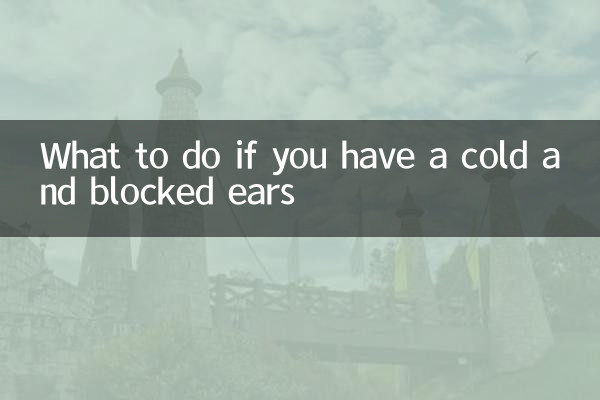What to do if you have a cold and your ears are blocked
The cold is a common respiratory disease, usually accompanied by symptoms such as nasal congestion, cough, and sore throat. However, many people also experience clogged ears during a cold, often due to a lack of connectivity between the nasal cavity and the Eustachian tube. This article will give you a detailed introduction to the causes, solutions and preventive measures of blocked ears due to colds to help you quickly relieve your discomfort.
1. Causes of blocked ears due to colds

The main causes of blocked ears during a cold are nasal congestion and Eustachian tube dysfunction. The Eustachian tube connects the nasal cavity and the middle ear. When the nasal cavity becomes congested and swollen due to a cold, the normal ventilation function of the Eustachian tube is blocked, resulting in an imbalance of pressure in the middle ear, resulting in the feeling of ear blockage.
| Reason | Specific performance |
|---|---|
| nasal congestion | Congestion and swelling of the nasal cavity, affecting Eustachian tube ventilation |
| Eustachian tube dysfunction | An imbalance of pressure in the middle ear, causing a feeling of blockage or fullness in the ears |
| Mucus accumulation | Mucus increases during a cold and may block the Eustachian tube |
2. Solution to blocked ears due to cold
If you experience clogged ears during a cold, you can try the following to relieve symptoms:
| method | Operation steps | Things to note |
|---|---|---|
| Nasal irrigation | Use saline or a neti pot to rinse your nasal passages to help reduce nasal congestion | Avoid using excessive force to avoid damaging the nasal mucosa |
| Pinch nose and blow air | Pinch your nose and blow air gently to help open the Eustachian tube | Avoid using excessive force to avoid damaging your eardrums |
| Hot compress | Apply a hot towel around the ears to promote blood circulation | The temperature should not be too high to avoid burns |
| Chewing or yawning | Mobilize the Eustachian tube by chewing gum or yawning | Suitable for mild ear blockage, the effect varies from person to person |
| drug treatment | Use decongestants or antihistamines to relieve nasal congestion | Follow medical advice and avoid long-term use |
3. When Do You Need Medical Treatment?
Although most ear congestion caused by colds can be relieved by the above methods, it is recommended to seek medical advice promptly if:
| Symptoms | Possible reasons |
|---|---|
| Ear blockage persists for more than a week | May develop otitis media or other ear disease |
| severe earache or hearing loss | Possible infection or eardrum damage |
| Ear discharge or bleeding | Possible otitis media or eardrum perforation |
| With high fever or dizziness | Could be a serious infection or inner ear problem |
4. Measures to Prevent Colds and Ear Blockage
To reduce the occurrence of clogged ears during a cold, you can take the following preventive measures:
| measures | Specific methods |
|---|---|
| Keep nasal passages clear | Treat nasal congestion promptly to avoid obstruction of the Eustachian tube |
| Enhance immunity | Eat a balanced diet and exercise moderately to reduce the occurrence of colds |
| Avoid blowing your nose forcefully | When blowing your nose, gently press one nostril to avoid excessive pressure |
| Maintain indoor humidity | Use a humidifier to prevent dry air from irritating the respiratory tract |
5. Summary
Blocked ears are a common phenomenon during a cold and are often caused by nasal congestion and Eustachian tube dysfunction. Symptoms can be effectively relieved through nasal irrigation, pinching the nose and blowing air, and applying hot compresses. If symptoms persist or worsen, seek medical attention promptly. Paying attention to strengthening immunity and keeping the nasal cavity clear can effectively prevent the occurrence of ear blockage.
I hope this article can help you better deal with the problem of clogged ears during a cold and get back to health as soon as possible!

check the details

check the details